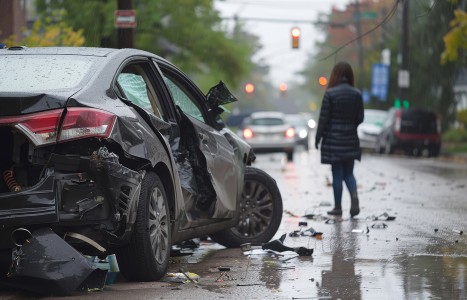In a landmark development, Blue Cross Blue Shield (BCBS) has reached a $2.8 billion settlement to resolve antitrust claims brought by health care providers, including chiropractors. The lawsuit accused BCBS of dividing the nation into exclusive regions and limiting competition, which resulted in lower reimbursements for providers. Although BCBS denies any wrongdoing, the company agreed to the settlement to avoid lengthy litigation – and you can get a piece of the pie.
Volunteer DC Dies in Terrorist Attack
Moshe Gottlieb,DC, was a passenger on an Israeli bus bound for the Tel Aviv suburb of Bnei Brak when his life was cut short by a suicide bomber on June 18.
The 70-year-old Dr. Moshe was born in Manhattan's Lower East Side. Seeking better weather after discovering that his son was afflicted with asthma, he left a career in the fur industry and moved his family to Southern California, graduating from the Los Angeles College of Chiropractic while in his 30s.
In 1972, Dr. Moshe visited Israel for the first time, and was so captivated by the country that he moved there in 1978. He became well known for his teaching at a synagogue in his hometown of Gilo, a Jerusalem neighborhood, and his volunteer work there as a gabbai (a sextant or nonclergy organizer). Friend and co-worker Eytan Miller remembered the doctor as the first to arrive in the morning and the last to leave in the evening, despite his typical days filled with chiropractic work.
Shortly after his arrival in Jerusalem, before moving to Gilo, Dr. Gottlieb met Ashkenazi Rabbi Eliahu Schlesinger, who would conduct the chiropractor's eulogy 24 years later. "The synagogue was his first home," he told the Jerusalem Post.
It was in a Jerusalem clinic for the chronically ill that the doctor saw most of his patients, including "a girl who was diagnosed with a brain tumor that he helped recover," Miller recounted to the Post. He attended the girl's wedding as a guest of honor.
"He would start his workday at 8:15 a.m., treat other people in the city, then go by bus to Bnei Brak, where every Tuesday he treated children with Down's syndrome, CP, and whatever, before returning to Gilo for afternoon prayers. I asked him once, 'Why don't you slow down a little, start your day a little later?' He replied, 'What can I do - people are waiting for me, for my treatment."
Dr. Moshe had a reputation for healing those deemed "untreatable" by others. Fellow "transplanted" Jerusalemite and DC, Isaac Freeman, spoke fondly of him: "I first met Dr. Gottlieb in 1988 on a late summer Friday night, after Sabbath prayers in a synagogue I attended while visiting friends in his neighborhood. He told me, 'Shalom - great to have another DC in Israel! (He was one of the first; I was the 14th.) If you're serious about helping people, and not just making a few shekels, I'll help you as much as you want.'
"And in 1990, I called him from Bnei Brak: 'I need some of your NOT (Neuro Organizational Technique) expertise,' in a special school for patients with Down syndrome, cerebral palsy; autistics and others where I began volunteering. 'Most of the kids love my adjusting, but others cry as soon as I enter the room.' Dr. Gottlieb made the 11-hour trip and started volunteering with me before I got married and moved up to Jerusalem."
Prior to taking public transportation to and from appointments, Dr. Moshe rode a Honda motorcycle, which was later stolen. He had boarded bus 32A, on one of the city's busiest lines, before an Islamic law student from An-Najah University entered at a stop in Beit Safafa , detonating a bomb filled with ball bearings and explosives. The DC and 18 others were killed, with dozens injured.
The toll taken on those family members left behind is obvious; the emotional, mental and physical strain all combine to create grief. Underlying this is the loss of care of several "special-needs" patients and others that only Dr. Moshe could care for. His wife, Sheila, gave a straightforward account to the Post (June 21) of the last day of her husband's life, and the aftermath of one "moment of violence" on June 18. She asked what one would say to the patients: "What can I say...'I am sorry, he can no longer treat you?'"
In his eulogy, Rabbi Schlesinger asked, "What will we do without you, Reb Moshe?...You were our tamid, always there to help or teach in the synagogue, to do good deeds or to just encourage us with your smile."
Dr. Freeman noted Dr. Moshe's volunteerism: "Everyone has a piece of history of how he changed lives; I know he changed mine." He added, "He would still be working there today - he loved those kids."
Moshe Gottlieb,DC, is survived by wife Sheila; a brother, Judah; a son, Seymour; a daughter, Feige; and 12 grandchildren. He was buried in Jerusalem on Thursday, June 20.
Jim Harrison,
Associate editor


